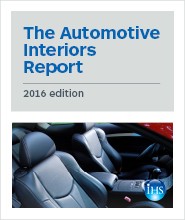
The Automotive Interiors Report
The world of automotive interiors is changing and the next few years will see this process accelerate; future vehicle interiors will very likely end up looking very different from those of today, and in some cases they will be almost unrecognisable from what we have come to expect from a conventional vehicle interior. It is not long ago that when analysts and commentators wrote about automotive interiors, the focus would be on seats and their adoption of electronic technology for automatic movement and comfort features; and on cockpits, especially whether they were assembled off-line, along with the complex logistics chain that went behind this. Some honourable mention would also be made of headliners, particularly when they began to incorporate acoustic insulation material for added value and customer benefit, as did carpets and other interior coverings. Companies like JCI, Lear, Visteon, Faurecia and Magna were – quite rightly at the time – seen as the dominant players in this market who would eventually take over the delivery of entire interior packages for the car companies.
This report looks at recent developments in automotive interiors at the major car companies, the technologies which they are already deploying, what they might deploy in the near- and medium-term and what this means for suppliers. In addition, from the supply side the report discusses how selected leading players’ strategies for vehicle interiors are changing.
The report ends with an appendix of 35 major Interiors suppliers providing an overview of the company and mapping data of global locations.
Executive Summary
Introduction
Mega-themes and market structure
Continued M&A activity
More market concentration in interiors?
The emergence of the Chinese
Automotive interiors – sub-segment commentary
Seats
Increased vertical integration in seat production
International moves in seat production
Seat supplier strategies: Lear, JCI and Faurecia all follow different routes
Lear – increased vertical integration and an expanding global footprint
JCI: a world leader, but now leaving automotive interiors
Faurecia: committed to seating and automotive interiors
Cockpits, dashboards, instrumentation and centre stacks
Instrumentation: three companies with over 50% of the global market
Centre stacks: prominent role for Asian suppliers
Vehicle manufacturer analysis
European premium vehicle manufacturers
Audi
BMW
Daimler Mercedes
Bentley
Japanese vehicle manufacturers – luxury and mass-market segments needs converging?
Lexus
Toyota
Suzuki
Nissan
Mid-market European brands adopting new interior approaches
PSA – a new interior look for the major brands
Citroën – from Cactus to Aircross
Peugeot – music and sound inspire the Fractal
Volkswagen
Volvo
Two alternative perspectives – from motor sport and motor cycles
McLaren
Yamaha – a new entrant with a new approach
Supplier Profiles
This report contains 35 profiles of the major automotive interior suppliers
Aisin Seiki
Alpine Electronics
Alps Electric
Autoneum
Bosch
Brose
Calsonic Kansei
Car Trim
Clarion
Continental
Denso
Dräxlmaier
Dura Automotive
Edscha
Faurecia
Flex
Ganxiang Mirror
Gentex
Grammer
Grupo Antolin
Harman
IAC
Infineon
Johnson Controls
Kongsberg Automotive
Lear
NHK Spring
Novem
Panasonic
Pioneer
Plastal
TomTom
Toyoda Gosei
TS Tech
Visteon





